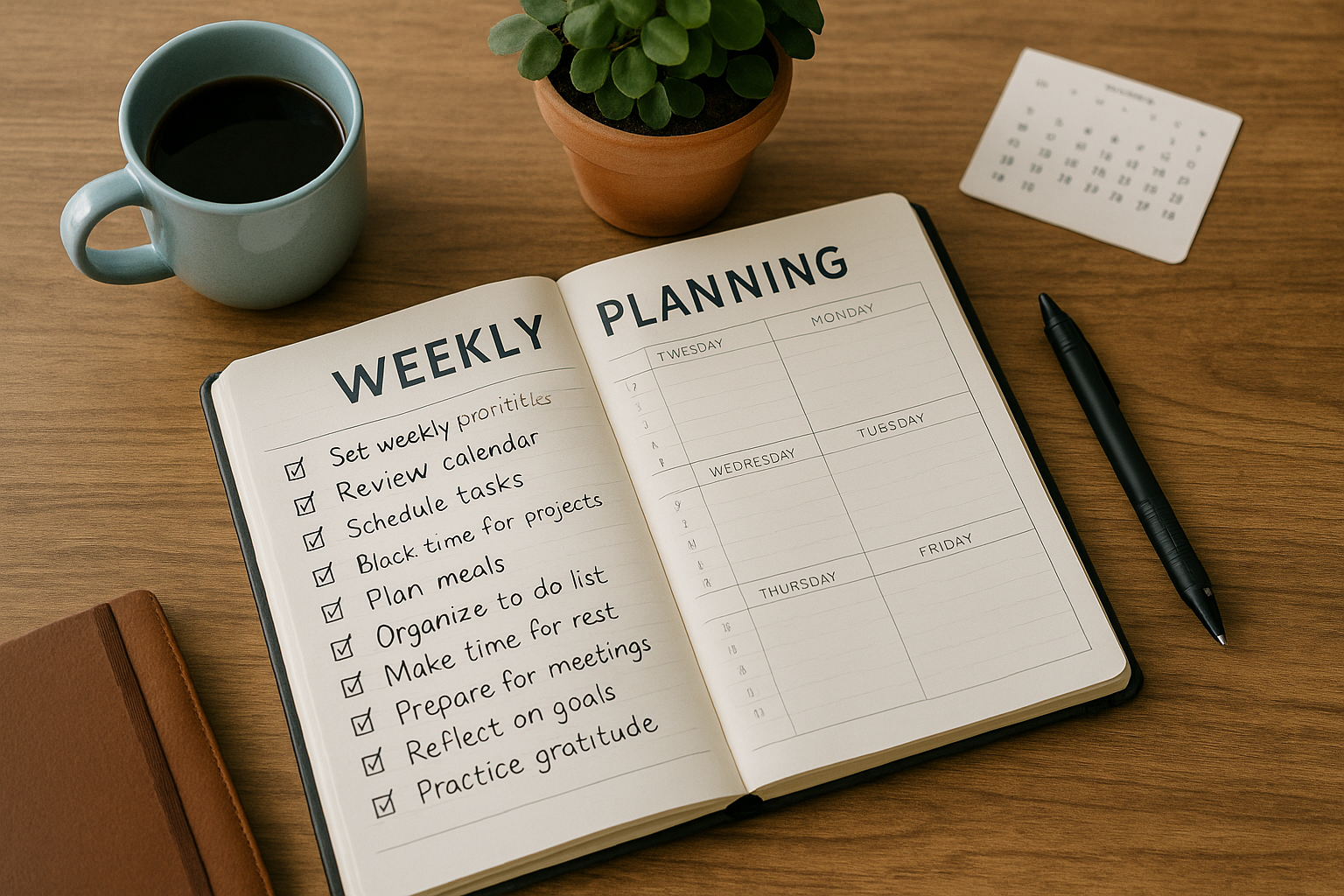Life moves fast. Between work, personal goals, errands, and unexpected events, it’s easy to feel like you’re always catching up. But what if you could take control of your week before it even starts?
Weekly planning isn’t just about being productive — it’s about creating a structure that supports clarity, balance, and peace of mind.
In this article, you’ll discover 10 powerful habits to include in your weekly planning routine so you can stay organized, feel less overwhelmed, and focus on what matters most.
Why Weekly Planning Is More Powerful Than Daily To-Do Lists
While daily lists help you stay on track, weekly planning gives you the big picture. It helps you:
- Align tasks with long-term goals
- Anticipate busy or stressful days
- Carve out time for rest and fun
- Avoid last-minute chaos
- Feel more in control of your time
It’s your chance to design your week intentionally — instead of reacting to it.
1. Set a Weekly Planning Ritual
Consistency is key. Choose a time and place each week to sit down and plan. Sunday evening or Monday morning work well for most people.
Tips:
- Block off 30–45 minutes
- Grab your planner, digital calendar, or journal
- Use music or tea to make it feel enjoyable
Turning planning into a ritual makes it easier to stick with.
2. Reflect on the Previous Week
Before jumping into planning, take a few minutes to review what happened last week. This creates awareness and helps you improve going forward.
Ask yourself:
- What were my wins?
- What challenges did I face?
- What did I learn?
- What should I carry into next week?
Reflection fuels growth and clarity.
3. Review Upcoming Events and Deadlines
Check your calendar for any upcoming appointments, meetings, social events, or travel plans. This prevents surprises and helps you plan your energy, not just your time.
Look for:
- Work deadlines
- Family obligations
- Personal appointments
- Travel or schedule disruptions
Know what’s coming so you can prepare.
4. Set 3–5 Weekly Priorities
What are the most important things to focus on this week? Narrowing your attention to just a few key priorities keeps you from feeling scattered.
Examples:
- Finish project draft
- Work out 4 times
- Complete tax paperwork
- Spend quality time with family
Let your priorities guide your daily to-do lists.
5. Break Big Tasks into Action Steps
If a task feels vague or overwhelming, you’re likely to avoid it. Break it down into small, clear steps.
Instead of: “Work on website”
Try:
- Choose template
- Write homepage copy
- Upload images
- Connect domain
Small steps reduce resistance and build momentum.
6. Time Block Your Week
Time blocking means assigning specific tasks to specific time slots. This boosts focus and prevents overcommitting.
Start by:
- Blocking out non-negotiables (work hours, appointments)
- Adding time for top priorities
- Including breaks, meals, and transitions
Even a loose schedule gives structure to your days.
7. Plan for Rest and Recharge
Your calendar shouldn’t just include tasks — it should reflect your well-being too.
Schedule:
- 7–8 hours of sleep per night
- Breaks between meetings or work blocks
- Exercise or outdoor time
- Social time or hobbies
- A full day off if possible
Rest isn’t a reward. It’s essential.
8. Prepare Meals and Outfits in Advance
Small choices add up. Planning a few meals or outfits in advance saves decision fatigue and reduces stress on busy days.
Ideas:
- Cook in batches on Sunday
- Choose 3 go-to outfits for the week
- Pack lunches or snacks ahead of time
A few minutes of prep equals hours saved later.
9. Review and Organize Your To-Do List
Declutter your list. Rewrite or reorganize it based on what’s truly important.
Use categories:
- Must do this week
- Can wait
- Delegate
- Personal vs. work
Keep your list short, actionable, and aligned with your priorities.
10. End with Gratitude and Intention
Close your weekly planning with a mindset check-in.
Try this:
- Write 3 things you’re grateful for
- Set an intention or focus word for the week (e.g., “clarity,” “ease,” “courage”)
- Visualize how you want to feel by Friday
This keeps your planning grounded and meaningful.
Plan With Purpose, Not Just Pressure
Weekly planning isn’t about squeezing more into your schedule — it’s about creating a life that reflects your values, energy, and goals. When you pause to plan, you give yourself space to choose rather than just react.
Start with just a few of these habits. Make them your own. And give yourself permission to plan in a way that feels supportive, not stressful.
You’re not behind — you’re in charge. Plan your week like it.
